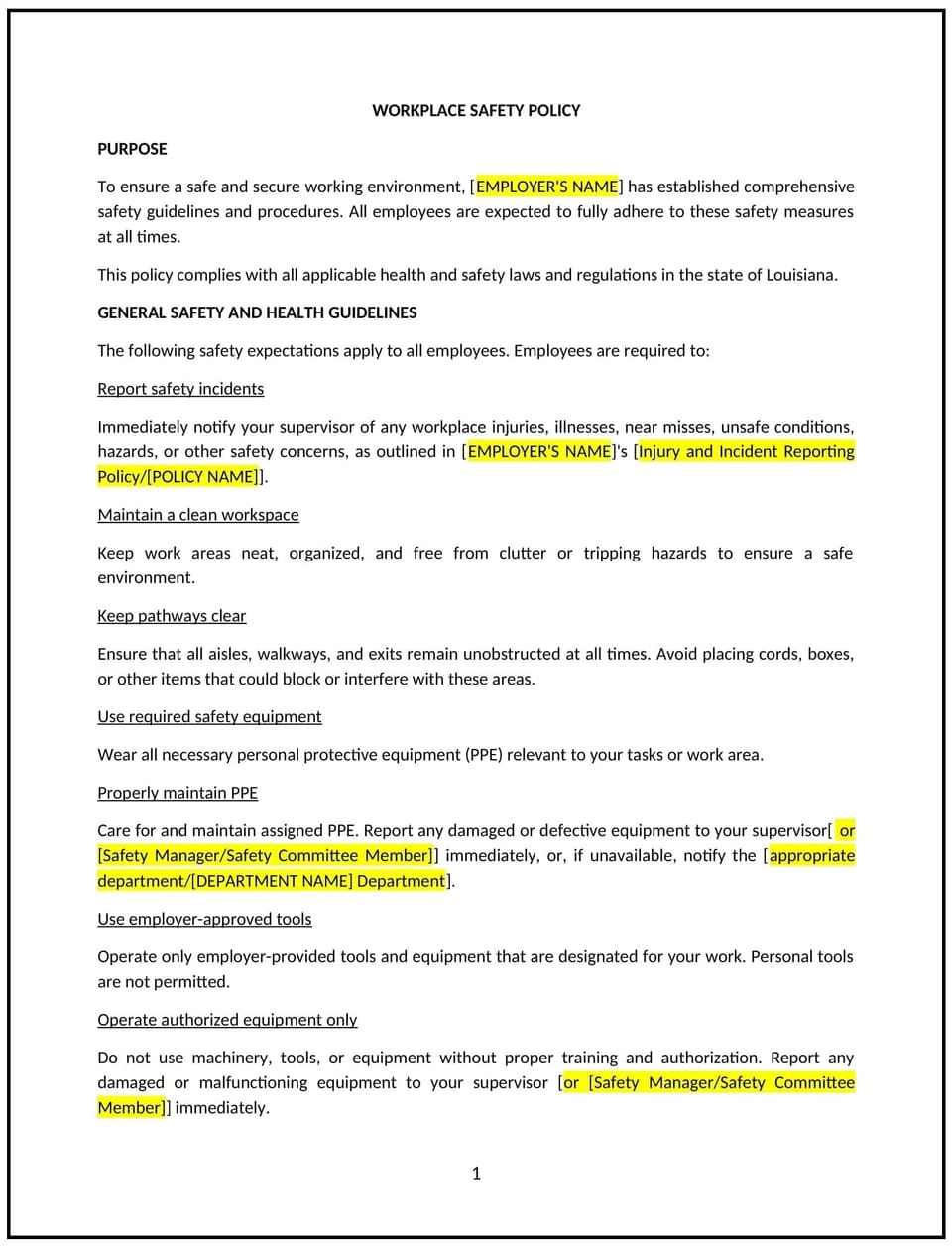Workplace safety policy (Louisiana): Free template

Workplace safety policy (Louisiana)
This workplace safety policy is designed to help Louisiana businesses create a safe and healthy work environment by establishing guidelines for identifying, preventing, and responding to safety hazards. It outlines procedures for reporting unsafe conditions, maintaining safety equipment, and promoting employee well-being.
By implementing this policy, businesses can reduce workplace injuries, ensure compliance with safety regulations, and foster a culture of safety.
How to use this workplace safety policy (Louisiana)
- Define safety expectations: Specify the general safety standards employees must adhere to, including safe use of equipment, proper ergonomics, and general workplace behavior.
- Identify common hazards: Highlight potential safety hazards specific to the workplace, such as machinery, chemicals, or physical risks like slips and falls.
- Provide reporting procedures: Detail how employees should report unsafe conditions, near misses, or accidents, including the steps to take and any reporting tools available.
- Outline safety training: Include mandatory safety training programs, such as fire safety, first aid, and job-specific hazard training.
- Detail emergency response procedures: Specify emergency procedures, including evacuation routes, fire drills, first aid protocols, and contact information for emergency services.
- Communicate responsibilities: Define the roles of employees, supervisors, and safety officers in maintaining a safe workplace and enforcing the policy.
Benefits of using a workplace safety policy (Louisiana)
Implementing this policy provides several advantages for Louisiana businesses:
- Reduces workplace injuries: Minimizes the risk of accidents and injuries through clear safety standards and proactive prevention.
- Promotes employee well-being: Fosters a workplace environment where employees feel safe, valued, and supported.
- Enhances productivity: A safe workplace leads to fewer disruptions, allowing employees to focus on their work.
- Demonstrates compliance: Helps the business meet local, state, and federal safety regulations, reducing legal risks.
- Reflects Louisiana-specific considerations: Adapts to regional safety requirements, environmental conditions, and workplace hazards in Louisiana.
Tips for using this workplace safety policy (Louisiana)
- Communicate clearly: Ensure that all employees are familiar with the safety policy and its expectations.
- Conduct regular safety audits: Perform periodic checks to ensure safety protocols are being followed and that equipment is maintained.
- Provide ongoing training: Offer refresher courses and updates to keep safety skills and knowledge current.
- Promote a culture of safety: Encourage employees to be proactive in identifying hazards and contributing to workplace safety efforts.
- Update regularly: Revise the policy as needed to incorporate changes in safety regulations, workplace conditions, or Louisiana-specific considerations.
Q: What types of safety hazards are covered under this policy?
A: The policy covers various hazards, including physical risks (e.g., slips, trips, and falls), machinery-related hazards, chemical exposure, electrical safety, and ergonomics.
Q: How should employees report unsafe conditions?
A: Employees should report unsafe conditions immediately to their supervisor or designated safety officer, using the reporting tools provided by the company.
Q: Who is responsible for maintaining workplace safety?
A: Safety is a shared responsibility; all employees must follow safety protocols, while supervisors and safety officers are responsible for enforcing safety practices and ensuring a safe work environment.
Q: How often should this policy be reviewed?
A: The policy should be reviewed annually or whenever significant changes in workplace conditions, safety regulations, or Louisiana-specific requirements occur.
This article contains general legal information and does not contain legal advice. Cobrief is not a law firm or a substitute for an attorney or law firm. The law is complex and changes often. For legal advice, please ask a lawyer.


